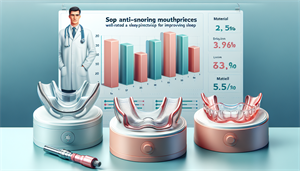
How the NBC Rossen Report on Snoring Mouthpieces Can Help You Sleep Better
Are you tired of sleepless nights due to snoring? The NBC Rossen Report Snoring Mouthpiece feature recently put the spotlight on anti-snoring mouthpieces, revealing their effectiveness in reducing snoring and improving sleep quality. In this article, we’ll guide you through the top anti-snoring mouthpieces and the importance of addressing snoring for your overall health.
Key Takeaways
The NBC Rossen Report provides consumer information on anti-snoring mouthpieces to help sufferers of snoring and sleep deprivation. The top anti-snoring mouthpieces are SnoreRx Plus, SleepTight Mouthpiece, and ZYPPAH for a comfortable and customizable fit with high effectiveness. Consultation with a healthcare professional is recommended prior to using an anti-snoring device combined with various lifestyle changes for better results.
The NBC Rossen Report on Anti-Snoring Mouthpieces
The NBC Rossen Report is an investigative unit led by Jeff Rossen, the National Investigative Correspondent for NBC. It focuses on uncovering scams, promoting cost-saving measures, and disseminating consumer information, including addressing snoring problems.
On August 26th, 2016 NBC's Jeff Rosen tested over the counter products to see which would stop snoring for a man suffering from snoring (full episode here). Snoring can result in sleep deprivation and other health issues, preventing a good night’s sleep. To help alleviate this problem, various anti-snoring mouthpieces, also known as mouth guards, have been developed. They help to ensure comfortable, uninterrupted sleep for snorers.
Top Mouthpieces
-
SnoreRx Plus
-
SleepTight Mouthpiece
-
ZYPPAH
The Importance of Addressing Snoring
Tackling snoring is vital for overall health because it can lead to complications like daytime sleepiness, mood swings, and concentration difficulties. Research has shown that snoring may be associated with a range of health issues, including decreased blood oxygen levels, obstructive sleep apnea, poor muscle tone in the throat and tongue, and an increased risk of cardiovascular problems. Additionally, snoring has been linked to conditions such as diabetes, obesity, hypertension, stroke, and heart attack. Chronic snoring can also lead to potential complications like daytime sleepiness and fatigue, mood swings and angry outbursts, and difficulty concentrating on tasks.
Mandibular Advancement Devices (MADs)
Mandibular Advancement Devices (MADs) work by moving the lower jaw forward, which helps to open the airway and reduce snoring. However, using an anti-snoring mouthpiece may cause tooth discomfort if not properly fitted. Before using any anti-snoring mouthpiece, it is necessary to have a discussion with a doctor to verify it is a suitable and safe solution for your specific needs.
Types of Anti-Snoring Mouthpieces: MADs and TRDs
Types of Mouthpieces
-
Mandibular Advancement Devices (MADs): These work by holding the jaw in place to prevent it from falling over the airway.
-
Tongue Retaining Devices (TRDs): These work by holding the tongue in place, as a result they can be used by people with missing teeth.
MADs and TRDs are the two primary types of anti-snoring mouthpieces available. MADs are designed to fit inside the mouth and facilitate the advancement of the lower jaw in order to open up the airway. They are particularly effective for those who snore due to the narrowing of the airway caused by the tongue and lower jaw falling back during sleep. Conversely, TRDs work by securing the tongue, preventing it from falling back into the throat—a common cause of snoring among those who sleep on their backs.


